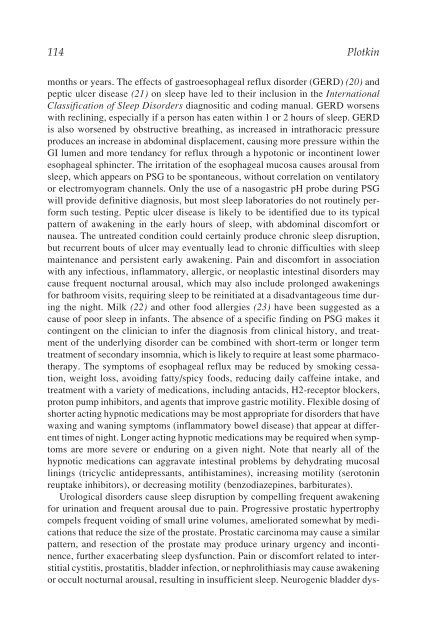Insomnia Insomnia
Insomnia Insomnia
Insomnia Insomnia
You also want an ePaper? Increase the reach of your titles
YUMPU automatically turns print PDFs into web optimized ePapers that Google loves.
114 Plotkin<br />
months or years. The effects of gastroesophageal reflux disorder (GERD) (20) and<br />
peptic ulcer disease (21) on sleep have led to their inclusion in the International<br />
Classification of Sleep Disorders diagnositic and coding manual. GERD worsens<br />
with reclining, especially if a person has eaten within 1 or 2 hours of sleep. GERD<br />
is also worsened by obstructive breathing, as increased in intrathoracic pressure<br />
produces an increase in abdominal displacement, causing more pressure within the<br />
GI lumen and more tendancy for reflux through a hypotonic or incontinent lower<br />
esophageal sphincter. The irritation of the esophageal mucosa causes arousal from<br />
sleep, which appears on PSG to be spontaneous, without correlation on ventilatory<br />
or electromyogram channels. Only the use of a nasogastric pH probe during PSG<br />
will provide definitive diagnosis, but most sleep laboratories do not routinely perform<br />
such testing. Peptic ulcer disease is likely to be identified due to its typical<br />
pattern of awakening in the early hours of sleep, with abdominal discomfort or<br />
nausea. The untreated condition could certainly produce chronic sleep disruption,<br />
but recurrent bouts of ulcer may eventually lead to chronic difficulties with sleep<br />
maintenance and persistent early awakening. Pain and discomfort in association<br />
with any infectious, inflammatory, allergic, or neoplastic intestinal disorders may<br />
cause frequent nocturnal arousal, which may also include prolonged awakenings<br />
for bathroom visits, requiring sleep to be reinitiated at a disadvantageous time during<br />
the night. Milk (22) and other food allergies (23) have been suggested as a<br />
cause of poor sleep in infants. The absence of a specific finding on PSG makes it<br />
contingent on the clinician to infer the diagnosis from clinical history, and treatment<br />
of the underlying disorder can be combined with short-term or longer term<br />
treatment of secondary insomnia, which is likely to require at least some pharmacotherapy.<br />
The symptoms of esophageal reflux may be reduced by smoking cessation,<br />
weight loss, avoiding fatty/spicy foods, reducing daily caffeine intake, and<br />
treatment with a variety of medications, including antacids, H2-receptor blockers,<br />
proton pump inhibitors, and agents that improve gastric motility. Flexible dosing of<br />
shorter acting hypnotic medications may be most appropriate for disorders that have<br />
waxing and waning symptoms (inflammatory bowel disease) that appear at different<br />
times of night. Longer acting hypnotic medications may be required when symptoms<br />
are more severe or enduring on a given night. Note that nearly all of the<br />
hypnotic medications can aggravate intestinal problems by dehydrating mucosal<br />
linings (tricyclic antidepressants, antihistamines), increasing motility (serotonin<br />
reuptake inhibitors), or decreasing motility (benzodiazepines, barbiturates).<br />
Urological disorders cause sleep disruption by compelling frequent awakening<br />
for urination and frequent arousal due to pain. Progressive prostatic hypertrophy<br />
compels frequent voiding of small urine volumes, ameliorated somewhat by medications<br />
that reduce the size of the prostate. Prostatic carcinoma may cause a similar<br />
pattern, and resection of the prostate may produce urinary urgency and incontinence,<br />
further exacerbating sleep dysfunction. Pain or discomfort related to interstitial<br />
cystitis, prostatitis, bladder infection, or nephrolithiasis may cause awakening<br />
or occult nocturnal arousal, resulting in insufficient sleep. Neurogenic bladder dys-


